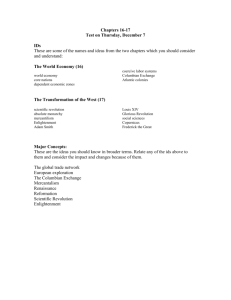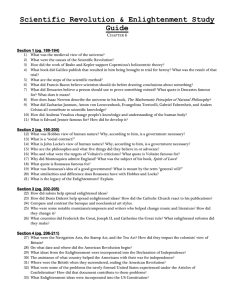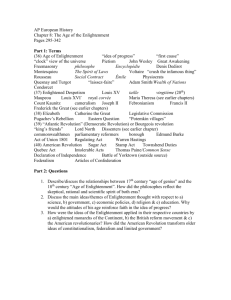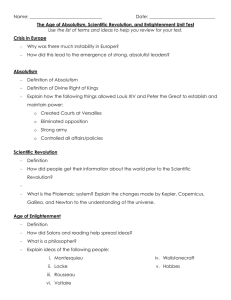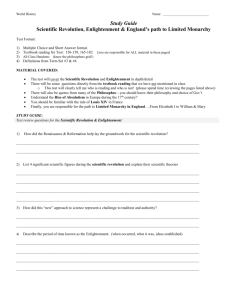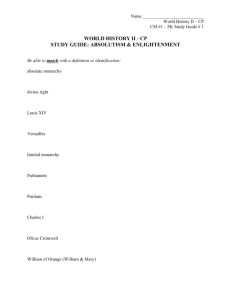AP European History Unit Assignment for Chs. 15
advertisement
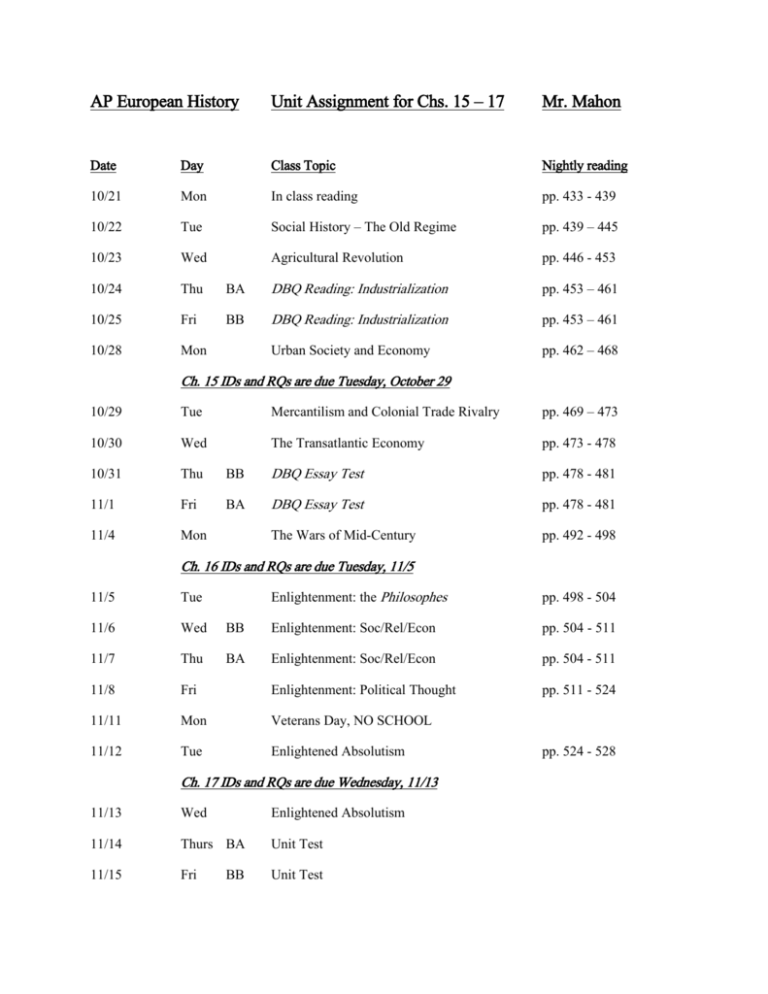
AP European History Unit Assignment for Chs. 15 – 17 Mr. Mahon Date Day Class Topic Nightly reading 10/21 Mon In class reading pp. 433 - 439 10/22 Tue Social History – The Old Regime pp. 439 – 445 10/23 Wed Agricultural Revolution pp. 446 - 453 10/24 Thu BA DBQ Reading: Industrialization pp. 453 – 461 10/25 Fri BB DBQ Reading: Industrialization pp. 453 – 461 10/28 Mon Urban Society and Economy pp. 462 – 468 Ch. 15 IDs and RQs are due Tuesday, October 29 10/29 Tue Mercantilism and Colonial Trade Rivalry pp. 469 – 473 10/30 Wed The Transatlantic Economy pp. 473 - 478 10/31 Thu BB DBQ Essay Test pp. 478 - 481 11/1 Fri BA DBQ Essay Test pp. 478 - 481 11/4 Mon The Wars of Mid-Century pp. 492 - 498 Ch. 16 IDs and RQs are due Tuesday, 11/5 Enlightenment: the Philosophes pp. 498 - 504 BB Enlightenment: Soc/Rel/Econ pp. 504 - 511 BA Enlightenment: Soc/Rel/Econ pp. 504 - 511 Fri Enlightenment: Political Thought pp. 511 - 524 11/11 Mon Veterans Day, NO SCHOOL 11/12 Tue Enlightened Absolutism 11/5 Tue 11/6 Wed 11/7 Thu 11/8 Ch. 17 IDs and RQs are due Wednesday, 11/13 11/13 Wed Enlightened Absolutism 11/14 Thurs BA Unit Test 11/15 Fri Unit Test BB pp. 524 - 528 Ch. 15 IDs and RQs Family economy The English Game Laws Jethro Tull Charles “turnip” Townshend The enclosure movement Cottage Industry (the “putting out system”) James Watt The water frame Spinning Jenny 1. A. B. C. What kinds of privileges separated European aristocracy from other social groups? How did their privileges and influence affect other people living in the countryside? What was the condition of serfs in central and eastern Europe? 2. A. B. C. What caused the Agricultural Revolution? How did the English aristocracy contribute to the Agricultural Revolution? Why did peasants revolt in the 18th century? 3. A. B. C. D. How did population growth affect consumption? What was the Industrial Revolution and what caused it? Why did Great Britain take the lead in the Industrial Revolution? How did consumers contribute to the Industrial Revolution? Ch. 16 IDs and RQs The Four Periods of European Overseas Empires Mercantilism Transatlantic Triangle of Trade War of Jenkin’s Ear The War of the Austrian Succession The Diplomatic Revolution of 1756 The Seven Year’s War Silesia William Pitt, the Elder 1. A. B. C. D. What were the fundamental ideas associated with mercantile theory? Did they work? Which European country was most successful in establishing a mercantile empire? Why? Which country was least successful? Why? 2. A. B. C. D. What was the nature of slavery in the Americas? How was it linked to the economies of the Americas, Europe, and Africa? Why was the plantation system “unprecedented”? How did the plantation system contribute to the inhumane treatment of slaves? 3. A. B. What were the results of the Seven Year’s War? Which countries emerged in a stronger position and why? Ch. 17 IDs and RQs Voltaire The Encyclopedia Adam Smith and the Wealth of Nations Beccaria Montesquieu’s Spirit of the Laws Jean – Jacques Rousseau’s Social Contract Enlightened Absolutism Joseph II Catherine II Frederick II Partitions of Poland 1. A. B. C. 2. A. B. C. D. 3. A. B. C. D. How did the Enlightenment change basic Western attitudes toward a) reform, b) faith, and c) reason? What were the major formative influences on the philosophes? How important were Voltaire and The Encyclopedia in the success of the Enlightenment? How did the views of the mercantilists about the earth’s resources differ from those of Adam Smith in his book The Wealth of Nations? Why might Smith be regarded as an advocate of the consumer? How did his theory of history work to the detriment of the less economically advanced non-European peoples? How did some Enlightenment writers criticize European empires? How did the political views of Montesquieu differ from those of Rousseau? Was Montesquieu’s view of England accurate? Was Rousseau a child of the Enlightenment or its enemy? Which did Rousseau value more, the individual or society? 4. A. B. C. D. Were the enlightened monarchs true believers in the ideals of the philosophes, or was their enlightenment a mere veneer? Was their power really absolute? What motivated their reforms? What does the partition of Poland indicate about the spirit of enlightened absolutism?
